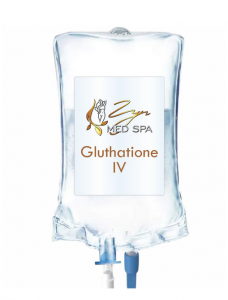What is Glutathione?
 Glutathione is a substance made from the amino acids glycine, cysteine, and glutamic acid. It is produced by the liver and involved in many body processes. Glutathione is involved in tissue building and repair, making chemicals and proteins needed in the body, and in immune system function. It is also an antioxidant produced in the body through enzymatic reactions, using the amino acids cysteine, L-glutamic acid, and glycine. It helps repair cells damaged by pollution, stress, and other harmful influences and is undeniably important.
Glutathione is a substance made from the amino acids glycine, cysteine, and glutamic acid. It is produced by the liver and involved in many body processes. Glutathione is involved in tissue building and repair, making chemicals and proteins needed in the body, and in immune system function. It is also an antioxidant produced in the body through enzymatic reactions, using the amino acids cysteine, L-glutamic acid, and glycine. It helps repair cells damaged by pollution, stress, and other harmful influences and is undeniably important.
What does Glutathione do?
Antioxidants enhance your feeling of vitality and well-being. Low glutathione levels detract from your good health—symptoms include fatigue, lower energy, achy head and joints, and a foggy brain, among other issues. In addition to not feeling your best, you may not look your best, either, because low glutathione contributes to wrinkles and saggy skin. You’ll notice a difference when you increase your glutathione levels with IV therapy.
There’s also promising research that glutathione could play a useful role in treating medical conditions such as glaucoma, cancer, heart disease, Parkinson’s disease, chronic fatigue syndrome, and more.
Benefits of Glutathione
Glutathione has several potential benefits, including:
- Antioxidant defense: One of the primary functions of glutathione is its role as a powerful antioxidant. It helps protect cells from oxidative stress by neutralizing harmful free radicals and reactive oxygen species. This antioxidant activity may help prevent cellular damage and support overall health.
- Detoxification: Glutathione is involved in detoxifying and eliminating various toxins, including pollutants, heavy metals, and more. It acts as a critical part of the body’s detoxification system by aiding in the breakdown and elimination of harmful substances.
- Immune system support: Glutathione plays a role in modulating the immune response. It helps enhance the activity of immune cells and promotes balanced immune function. Low levels of glutathione have been associated with compromised immune system function.
- Energy production: Glutathione is involved in energy production within cells. It supports mitochondrial function, which is critical for generating cellular energy in the form of ATP.
- Potential anti-aging: Some research suggests that maintaining optimal levels of glutathione may contribute to healthy aging and longevity, as higher glutathione levels are associated with better cellular function and reduced oxidative stress.




